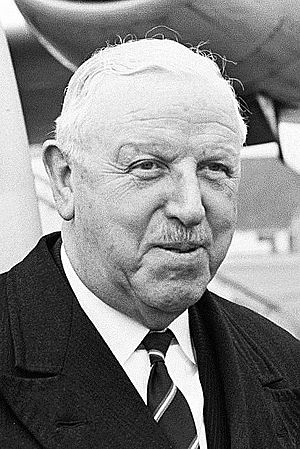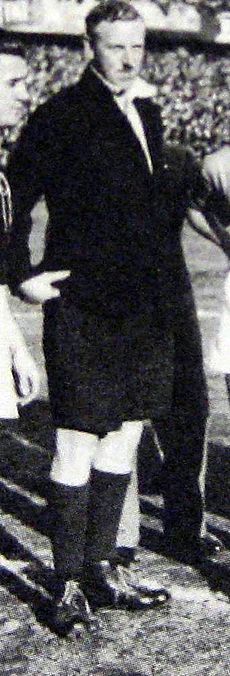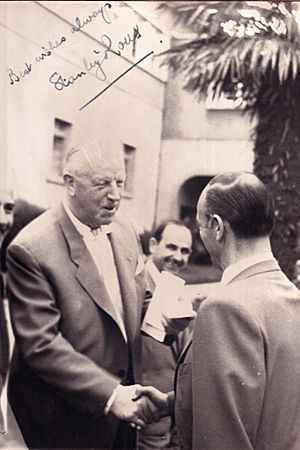Stanley Rous facts for kids
Quick facts for kids
Stanley Rous
|
|
|---|---|

Stanley Rous in March 1966
|
|
| 6th President of FIFA | |
| In office 28 September 1961 – 8 May 1974 |
|
| Preceded by | Arthur Drewry Ernst Thommen (as acting) |
| Succeeded by | João Havelange |
| Personal details | |
| Born |
Stanley Ford Rous
25 April 1895 Mutford, East Suffolk, England |
| Died | 18 July 1986 (aged 91) Paddington, London, England |
| Spouse |
Adrienne Gacon
(m. 1924; |
| Occupation | Referee and Football Administrator |
Sir Stanley Ford Rous (born 25 April 1895 – died 18 July 1986) was an important English football referee. He became the 6th President of FIFA, which is the world's football governing body. He held this top position from 1961 to 1974. Before that, he was the secretary of the Football Association in England from 1934 to 1962. He was also an international referee for many years.
Contents
Early Life and Education
Stanley Rous was born in a place called Mutford, near Lowestoft in East Suffolk, England. He went to Sir John Leman School in Beccles. His father supplied food, but Stanley chose to train as a teacher in Beccles.
During World War I, he served in the army as a leader in the 272nd brigade of the Royal Field Artillery. He traveled to places like France, Palestine, Egypt, and Lebanon during his service.
After the war, Rous continued his studies at St Luke's College in Exeter. He then became a sports teacher at Watford Boys Grammar School.
Refereeing Career
Stanley Rous loved football and played as a goalkeeper for amateur teams like Kirkley and Lowestoft Town. However, he had to stop playing after he broke his wrist.
He then became very interested in being a referee. He qualified as a referee while he was studying at St Luke's College. By 1927, he was a referee in the Football League. His first international match as a referee was in Belgium, where Belgium played against the Netherlands. He ended up being the referee for 34 international matches in total.
Rous reached the very top of refereeing when he was chosen to referee the 1934 FA Cup Final. This big match took place at Wembley Stadium. In that game, Manchester City beat Portsmouth 2-1. The very next day, after refereeing another international match in Belgium, Rous decided to stop being a referee.
He made a huge difference to football by rewriting the Laws of the Game in 1938. He made them much simpler and easier for everyone to understand. He also helped make the diagonal system of control a standard way for referees to move around the field during a game. This system helps referees cover the field better and make more accurate calls.
Football Administrator
After his refereeing career, Rous moved into managing football organizations. He worked as the secretary of the Football Association in England from 1934 to 1962. He also joined the Executive Committee of UEFA (the European football body) in 1958. He became UEFA's vice-president in 1960.
The next year, he became the president of FIFA, the world's main football organization. He was FIFA president from 1961 to 1974. During his time as president, England won the World Cup in 1966, which was a big moment for his home country.
Challenges and Changes in FIFA
During his time as FIFA president, Stanley Rous faced challenges related to fairness in football. He supported the idea of the South African Football Association being part of FIFA, even though their teams were separated by race (this was during the time of apartheid in South Africa). FIFA had rules against discrimination, and South Africa had been suspended in 1961 because of these rules.
In 1963, South Africa was allowed back into FIFA after Rous visited the country. However, this decision was not popular with many African and Asian countries. They believed that football should be fair for everyone, regardless of their background. Because of strong opposition, South Africa was suspended again shortly after and was finally removed from FIFA in 1976.
Rous continued to try and get South Africa back into international football. He even thought about creating a special group for Southern African teams. But other countries, especially those from Africa, made it clear they would leave FIFA if this happened. So, he had to change his plans.
In 1974, Rous tried to be re-elected as FIFA president. However, he was defeated by João Havelange. Many countries were unhappy with European countries having too much power in FIFA. Also, African and Asian countries opposed Rous because of his stance on South Africa. After he retired, he was named Honorary President of FIFA on 11 June 1974.
A football tournament called the Rous Cup was named after him for a short time. Also, a stand at Watford F.C.'s Vicarage Road stadium was named the Rous Stand. He also wrote a book called A History of the Laws of Association Football in 1974.
Personal Life and Legacy
Stanley Rous married Adrienne Gacon in 1924. He received an honor called CBE in 1943. He was also made a knight in 1949, which meant he could use the title "Sir." He was a lifelong friend of Dr. Ivo Schricker, who was one of the people who helped start FIFA.
Later Years and Death
Stanley Rous passed away in Paddington, London, in 1986, at the age of 91. He died from leukaemia, a type of cancer. A special service was held in his memory at Westminster Abbey later that year.
He is buried with his wife, Lady Rous, in the Holy Trinity Church. This church is located in the Lickey Hills, near Bromsgrove and Birmingham.
See also
 In Spanish: Stanley Rous para niños
In Spanish: Stanley Rous para niños
 | Frances Mary Albrier |
 | Whitney Young |
 | Muhammad Ali |



